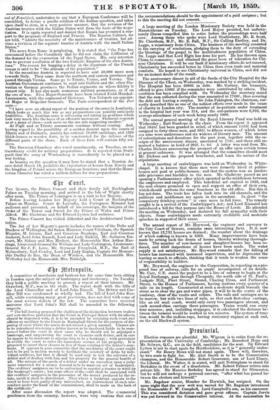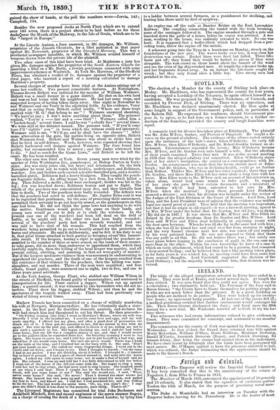Election rumours are plentiful. Mr. Wigram is to retire from
the re- presentation of the University of Cambridge; Mr. Beresford Hope and Mr. Selwyn, Q.C., are in the field, candidates for the seat. Sir Edward Lytton is not to start again for Hertfordshire, so it is " generally under- stood." Sir Henry Mena will not stand again. There will, therefore, be two seats to fight for. Mr. Abel Smith is to be the Conservative champion, and the Honourable Robert Grosvenor, son of Lord Ebury, the Liberal. Mr. Walter, it is stated, will quit Nottingham to stand for Berkshire in the event of a dissolution. Mr. Robert Palmer retires into private life. Sir Maurice Berkeley has agreed to stand for Gloucester, but he will not undergo a personal canvass, "after what has passed be- tween the electors and himself."
Mr. Bagshaw senior, Member for Harwich, has resigned. On the same night that the new writ was moved for Mr. Bagshaw introduced the Honourable F. W. Campbell, Lord Campbell's son, as his successor. This was considered dictation and gave great offence. Captain Jervis was put forward in the Conservative interest. At the nomination he
gained the show of hands, at the poll the numbers were—Jervis, 145 ; Campbell, 134.
Besides the new proposed docks at North Fleet which are to extend over 165 acres, there is a project about to be laid before us for three decks near the Mouth of the Medway, in the Isle of Grain, which are to be the "largest in Europe."
At the Lincoln Assizes, a Jury amerced, in 201. damages, Mr. Williaon, proprietor of the Lincoln Chronicle, for a libel published in that paper against Mr. Newcomb, proprietor of the Stamford Mercury. This was a provincial newspaper squabble, in which Mr. Wilson availed himself of weapons drawn from the private life of the plaintiff.
Two other cases of this kind have been tried. At Maidstone a jury has given 20s. damages against the proprietor of the South Eastern Gazette for inserting a libel on a Mr. Davis, a Jewish gentleman connected with some improvement schemes at Woolwich. At York Mr. Harrison, of the Sheffield Thnes, has obtained a verdict of Is. damages against the proprietor of a rival paper, who inserted a report of a meeting calculated to damage Harrison's property.
Several charges of murder have been tried at the Assizes arising- out of game law conflicts. Two present remarkable features. At Nottingham, Thomas Brown Birkett was indicted for the murder of William Wetmore. Birkett was a small farmer in a game district. He shot on his own land and was on bad terms with his neighbours. He had lost some traps, and suspected keepers of having taken them away. One night in November he saw Watmore and one Vesey in the adjoining fields. In his evidence, Vesey said that on seeing them Birkett called loudly, "Where are those traps marked with 'H. G.' that belong to me" ? Watmore answered shouting, -" We have'nt any ; I don't know anything about them." The prisoner applied, "You're a — liar and a — thief" ! Wetmore called him a 4‘ bucket-head," several times. I said he was " a chuffy face " several times. We were still at the distance named. The prisoner said, " If you'll come here rightle ' you " (a term which the witness could not interpret). Wetmore said to me, "We'll go, and he shall have the chance" ! After some altercation at the gate, the parties being on opposite sides, Birkett shot Watmore dead. Birkett said Watmore was about to strike him and that he fired in self-defence. Words, however, were reported showing that Birkett harboured evil designs against Watmore. The Jury found him guilty, but recommended him to mercy ; and the Judge sentenced him to die. " And so much for the Game Laws," said Birkett as he left the .00urt. He has been respited. The other case was tried at York. Seven young men were tried for the murder of John Washington Jex, gamekeeper, at Bishop Burton in York- shire. Jex was sixty years old, but brave and determined. On the 16th November he went out to watch with Geddes, underkeeper, and Robinson, watcher. lex and Geddes each carried a double-barrelled gun, and a double- barrelled pistol. Robinson had a heavy bludgeon. They caught the poach- -era flagrante delicto. An affray began by a shot from Jex which killed a dog. Then followed a melee ; shots were exchanged; Geddes was hit in the leg ; Jex was knocked down ; Robinson beaten and put to flight. The wrath of the poachers was concentrated upon Jex, and they literally beat him to death. Two of the poachers were badly wounded. The defence was that the poachers had acted in self-defence. Mr. Justice Byles said it was to be regretted that gentlemen, for the sake of protecting their amusement, permitted their servants to go out heavily armed, as the gamekeepers in this .case had been. He did not think the game laws had anything to do with the matter. Gentlemen would protect the game on their lands, and young men would go out to defy or to elude the watchers. In the present case one of the watchers had been left dead on the field of battle, as he might call it, the other two had been badly wounded; several of the poachers' party had been severely wounded, and one 'was said to have died of his wounds. This had resulted from the watchers being permitted to go out so heavily armed for the proteotion of hares and pheasants. He-said it deliberately, and he felt it his duty to say it, that great blame attached to both parties in bringing about this lament- able result. If the keepers, having a right to apprehend the poachers as- sembled to the number of three or more armed, on the lands of their master, to take game, did no more than endeavour to apprehend them, which they lawfully might do, then the killing of the head keeper was murder, and all present aiding, abetting, and assisting in that act were guilty of murder. But if the keepers used more violence than was necessary in endeavouring to apprehend the poachers, and the death of one of the keepers resulted from the resistance of that violence by the poachers, then the killing was man- slaughter, and not murder. Three of the men were acquitted ; and four others, found guilty, were sentenced one to eight, two to five, and one to three years penal servitude.
At the York Assizes, George Plant, who stabbed one William Wilson in the streets of Sheffield, was found guilty of manslaughter, and sentenced to transportation for life. Plant carried a dagger. Wilson ran up against him ; a quarrel ensued; it was witnessed by two bystanders who did not in- terfere. Plant drew his dagger, stabbed Wilson ; and then he and the spectators of the tragedy walked away. Plant had been previously con- -slated of felony several times.
Mathew Francis has been committed on a charge of wilfully murdering his wife at Newport, Montgomeryshire. He has voluntarily made a state- ment. In the first part he describes domestic quarrels, and declares his wife had struck him and threatened to cut his throat. He then proceeds-
" On Friday evening [the 11th] I went to Hawkins's House, where my wife was. Directly I went In she insulted me. I sent for some beer and egos, and my wife made egg-flip. I offered her my glass, and after a good deal of persuasion she drank out of it. I then put the question to her, did she intend to live with me again She rose up the pint jug, and offered to throw it at me, telling me not to put such a question to her. She began checking me, and I said she had better come home, that my life was a complete misery to me, and that I would sooner go to the gallows than be separated from her. On Saturday morning I went to her again. She began to curse me, and I told her not to put herself in a bad way, and asked her if she would come home. She said she never would. There was a knife ,on the table at the time, and I touched her on the beet with it. She said, ' Don't put your hands on me.' She called me many disgraceful things. I went out to the -closet and sat down, and I began to cry. Then I thought to myseh 'out the razor I had in my pocket. I was not thinking about it before. I brought it intend- ing to have it ground. I had a piece of thread around it, and went into the house again. I asked my wife again to come home, not to make a fool of herself and me too. She refused. I rose up and told bar I was fully determined to kill her before I went out of the house if she did not come with me. She began to sing a song. I told her not to sing songs, she had more need to sing hymns. She laughed aloud at me when I said that. Then I caught her by the forehead and said, ' Now, Sarah, will you come home or not ? She said she would not. I said, • What, never conic home ?' She said, ' No never.' Then I drawed the razor across her throat. She heaved her two arms up and caught me round the neck, and pulled my face to hers, and kissed me. I told her I had murdered her, and was willing to die for her. The last words she spoke were, ' 011, no, you shan't die.' I sup- pose she didn't think it was done to the purpose, poor thing. Thetis all."
The Liverpool Magistrate has committed for trial John Buchanan and Archibald Mitchellt first and second engineers of the screw steamer Bogota, on a charge of causing the death of a fireman named Landor, by tying him
to a ladder between several furnaces, as a punishment for skulking, and leaving him there until he died of apoplexy.
An engine ran off the rails at Bamber Bridge on the East Lancashire Railway. The coupling connecting the tender with the train breaking, none of the carriages followed it. The engine smashed through a gate and_ knocked down the gable of a house, before its course was arrested. A wo- man, washing in the house, was suddenly revealed to view. No one was hurt. It is supposed that a buffer-block which had dropped from a pre- ceding train, threw the engine off the metals.
A schooner going into the Tyne in a hurricane on Monday, struck on the foundations of the new pier. The waves broke over her, it was clear her destruction was certain. Rocket lines were fired but failed. Three life- boats put off; they found they would be dashed to pieces if they went alongside. The vast crowd on shore heard above the tumult of the wind and sea the cries of the shipwrecked men. At length the schooner broke up, and her fragments floated away. In an instant the life-boats sought the wreck ; but they only found alive a little boy. Five strong men had perished in the sea.



































 Previous page
Previous page